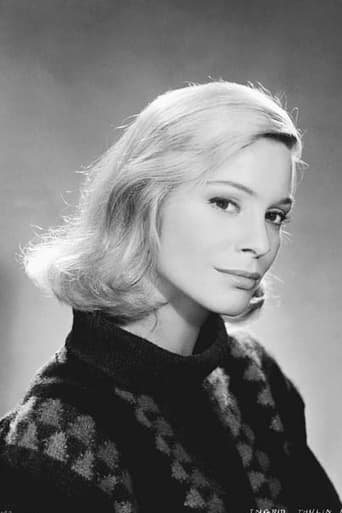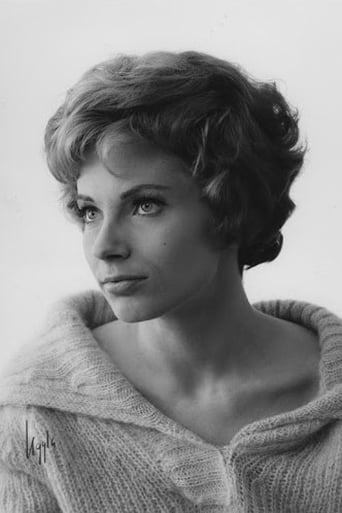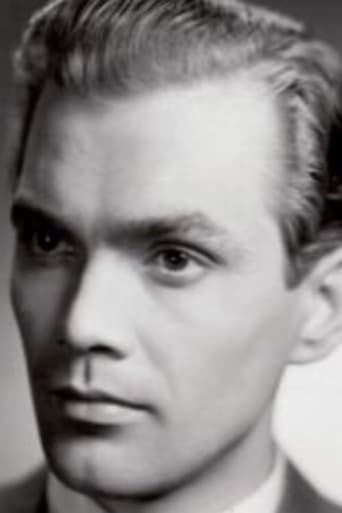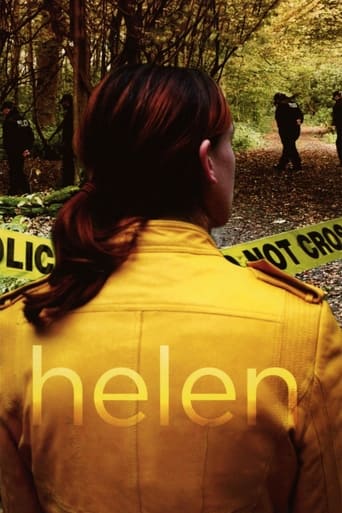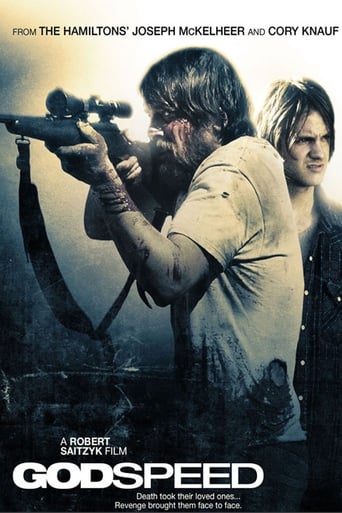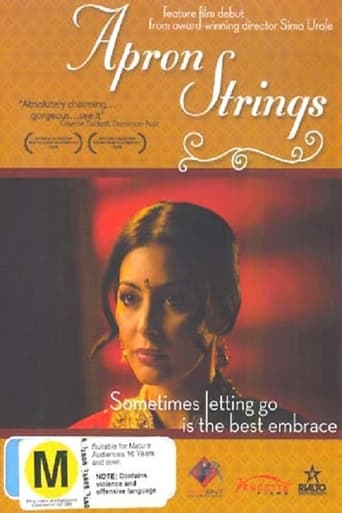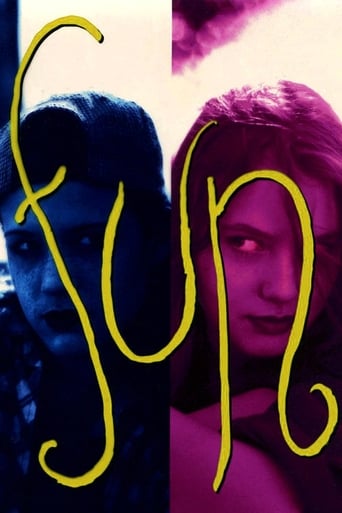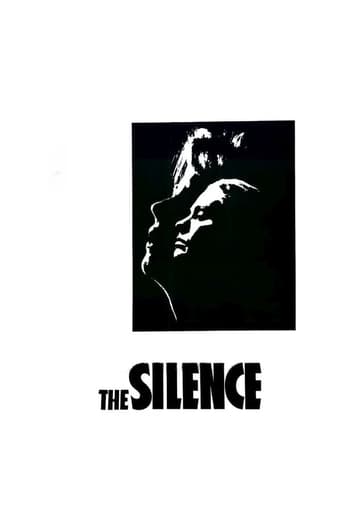
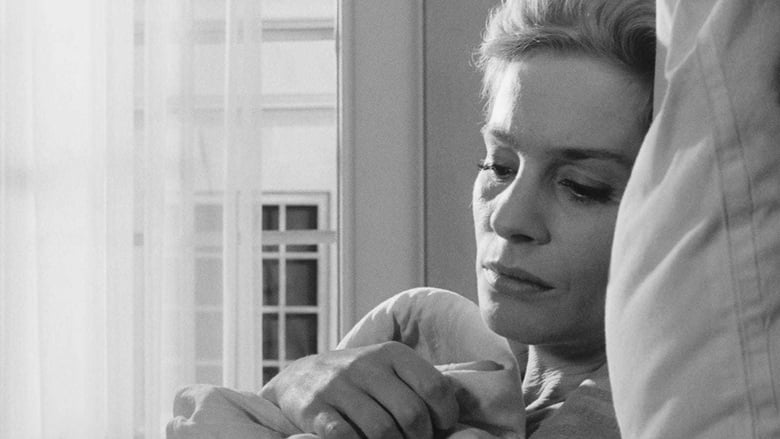
The Silence (1963)
Traveling through an unnamed European country on the brink of war, sickly, intellectual Ester, her sister Anna and Anna's young son, Johan, check into a near-empty hotel. A basic inability to communicate among the three seems only to worsen during their stay. Anna provokes her sister by enjoying a dalliance with a local man, while the boy, left to himself, has a series of enigmatic encounters that heighten the growing air of isolation.
Watch Trailer
Cast


Similar titles
Reviews
Bergman's response to L'Avventura, released only a couple years prior, and its aesthetic revelations. Also a mediation on the then recent Cuban Missile Crisis. This might be Bergman's most visually satisfying film, and is almost certainly that of Sven Nykvist. The opening tracking shot, a gallery of devastating close-ups in one take, is breathtaking, enough to put any director/ DP on the map. (Of course, they were both already very much on the map.) Faced with mechanized, militarized extinction, our race's impulses towards intimacy become inverted. Perhaps only translation/ transformation can redeem being- as it is, its just screwed.
Appropriately there really is very little dialogue in Bergman's THE SILENCE. Sometimes ten whole minutes will pass between the sparse and often caustic verbal spats between two sisters temporarily stuck in a large and mysterious Eastern European hotel while one recovers - or not - from some unspecified chronic illness that has interrupted their railway journey. Between the spiteful jibes and the longing glances into space the pair pay sporadic attention to the young son of the healthy sister and it's through his eyes that we observe much of what's going on beyond the walls of the hotel suite. He roams the corridors (as the boy in Kubrick's THE SHINING would do over a decade later) encounters a troupe of dwarf performers and a curiously friendly/sinister/comic waiter who communicates by improvised hand signals as he, like the other hotel staff members, does not share a common language with any of the three main characters. This lack of communication in itself becomes a central element in the pervading and stifling 'silence'.In the streets below we see tanks rumbling past and occasionally jet aircraft scream overhead. Is this Hungary in 1956? Are we seeing the Soviets quelling the popular uprising? If it is the cars we see are a bit too modern... But the sisters don't seem to know and the language barrier restrains us too. While the boy amuses himself observing the bizarre characters, some of whom he play-shoots with a toy pistol, his bored mother is amusing herself with various men whom she either beds in empty hotel rooms or admits to pleasuring in dark corners of a nearby church. All her encounters are wordless and her actions self-gratifying. This promiscuity highlights an area of the sisterly conflict.While the healthy one flaunts her heterosexuality, the sickly one seems pious and disapproving, although she is not averse to pleasuring herself. In one scene she lies back on the bed during a respite from her illness, unties her pyjamas and slides her hand between her legs as the camera pans demurely away to her face which contorts for a brief moment of release. At other times she seems driven to distraction by what could be an incestuous lesbian obsession with her sister. This is all deep and obliquely referenced leaving the viewer to form opinions rather than having then handed over on a platter. What is the deal here? Typical Berman! On the production side the photography is superb, as always, but softer and less naturalistic than in his later films. However the opening train carriage scene has no sense of being anywhere but inside a studio with back projection and model work that while it's up to the standards of Hollywood movies of the time,looks very unconvincing today. But the acting is excellent; the little boy is marvellously awestruck and natural, his mother is suitably sensual as she wanders around the interiors in a half open dressing gown revealing glimpses of her panties and the occasional bare breast in a most matter-of-fact fashion. The sickly sister is brim-full with melancholy and regret. Her frustration is palpable. The other characters are largely caricatures in the manner of Fellini, but none the worse for that.Is it a good film? Answers on a postcard please...It really depends on how you receive it and how shocked you are by the sexual references and the one, brief, graphic scene which back in the day was the cause of much censorship discussion I'm sure!
A film I definitely need to see again. My first reaction was the same I've had to many of Bergman's films: deep admiration, but not personal adoration. In this case, the more extreme, self-conscious surreal style threw me off. This feels more like something by Bunuel, Fellini, Beckett or Lynch (all of whom I love). Two sisters, polar opposites – one sensual, emotional, promiscuous, self-centered, representing the body, the id. The other, intellectual, sickly, sexually isolated stands for mind or super ego. The child of one, perhaps 8 years old, is accompanying them on a train trip, heading home. We never know where they're coming from or why they went. They stop in a city clearly preparing for war, or under some sort of military occupation. They stay in a baroque but almost abandoned hotel, unable to communicate with anyone, since this unknown land has a language none of them speak. While one sister picks up lovers, and the other languishes ill in bed, the boy explores the creepy hotel (The Shining was definitely influenced by this), making friends with a circus full of dwarf performers, who, pointedly, are the most normal people in the film. All of this is done with very little dialogue (to the point where the effect felt forced and self- conscious at times). I had a hard time clicking in while watching the film, but images and moments have really stuck with me, and reading why so many intelligent critics think it's a masterpiece makes me very open to re-visiting this extremely open ended, stylized film.
This completes, for me, the trilogy so often mentioned in film study. This is by far the harshest. It must have really raised eyebrows in its time. A commentator talks about it being one of the most viewed of Bergman's films, though perhaps for the wrong reason. It is an intense treat for the eyes of a sickening relationship between two sisters who are polar opposites. One is dying and the other is hot to trot. The latter feels she has been intimidated by her more cerebral sister throughout her life and has no time for her, even as she faces death from what appears to be consumption. In the mix is Anna's young son who acts like a little child, although there is an unhealthy quality to his relationship with his mother. The boy is a breath of fresh air in this sickening ethos. They are in a nameless hotel which creates a place for the boy to run while the women go about their sad existences. The Silence is about the silence. There is no talk to speak of until things get really intense. Many times there are three or four minutes without a word spoken. There is virtually no music. There are sounds of war, but we are not let in on what war this is. We don't even know where we are. Anyway, I have decided that life isn't so bad after spending three sessions with the characters in this trilogy. So much angst. What a blessing Ingmar Bergman is. He saw into the souls of characters, and, while what he saw wasn't pleasant, he presented them to us with a skill that will never be matched.


